
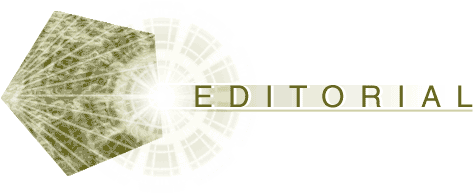
alone in the kitchen
eileen gunn
from my statements on a panel
at the 15th annual Conference
on Computers, Freedom, and Privacy,
April 12-15, 2005 Seattle, Washington
|
04.15.05
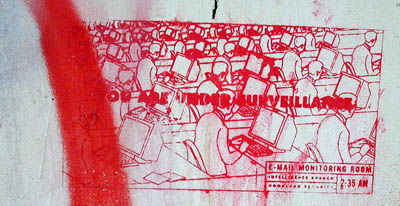
The surveillance devices I've heard discussed here this week at CFP-2005 are really upping the ante for science fiction, especially for social satirists like myself. It's no longer surreally futuristic to think that your unpaid parking tickets could be read in real time when you stop at a traffic light, or that your tax records might be linked to your driver's license. I don't really consider it my job, as a science-fiction writer, to project realistic futures. I try to come up with the weirdest future I can, but I am pretty confident that the real future will be weirder. Especially after the panels of the past two days. In my story Nirvana High (written with Leslie What), I posited a situation in which schools couldn't legally deny entry to children with guns, because the gun-control lobby argued that they needed them for self defense, so each school has a "twitch switch," a palm-contact sensor that tries to determine which children will use their guns aggressively. In pre-Columbine 1997, when I wrote that, it was satire. In a relatively short time, however, we will have devices that will tell us not only whether someone has a gun in his pocket, but whether he's glad to see us — and I expect that one of the first places those devices will be deployed will be at school entrances.
Telepathic grocery checkouts? If you can not only read people's body language and determine their motivation, but have already extrapolated that to the automated mining of thousands of surveillance tapes for signs of thieves and terrorists, what interest can the future possibly hold? Well.... how about brain-wave readers? As brain-imaging technology becomes more and more sophisticated and computer processing power and storage continue to increase exponentially, it will become possible to scan brains on the fly and interpret the data in real time — simultaneously using techniques like functional MRI, MEG magnetoencephalography) or EEG (electroencephalography) in order to read information about someone's emotional state. Give us a decade or two: we'll be able to detect regional brain activity on the fly and grasp its implications — intentionality, for instance. [NB: Another attendee at CFP suggested that machine telepathy is closer than I thought, and directed me to Augmented Cognition International.] A quick real-time brain scan, perhaps while someone is performing a mental task, would show how that person was using their brain, and could be used in combination with other info to assess children's potential, assign schoolwork, deny them fast-track academic programs/jobs/promotions, etc. Aggregating that info and mining it, you'd no longer need the cumbersome surveillance programs we've seen demonstrated here, that try to guess what somebody's thinking by monitoring their movement pattern (lurking, loitering, etc.) You could assess them directly from brain activity. A simpler way to do that, though, might be with devices that can, at a distance, monitor heartbeat, respiration, and other clues to elevated stress levels. Criminals and terrorists, and (especially) ordinary people would want to achieve levels of yogic calm before walking past a security monitor. There'd be little escalating wars between people and devices, as the devices sought greater and greater sensitivity, and the people sought to achieve greater and greater levels of Zen-like calm.
Consider a future when all the info collected can be accessed and mined, and is available boiled down and relevant in real time. This future will not be evenly distributed. Different people will have different kinds of access to information. People with money, for instance, will be able to afford better information. Also, people will be interpreting this info according to different algorithms, and making different decisions. I'm a fiction writer, and my job is to create problems, because you don't really have an sf plot unless you've got a problem. My worse-case scenario for everything is: what would it be like at Microsoft? Not so much what would Microsoft do with the technology, but more to the point, if you worked at Microsoft, how would your co-workers use the technology, with the best intentions, to make your life miserable? Can you imagine going into an ordinary interdepartmental meeting at Microsoft, say, in which people had handhelds that told them what everyone else's emotional state was? It's bad enough now, when you're just guessing about which of your co-workers would wipe you out with a flick of the finger. Someday you could know. And they could know what you thought. And, of course, the info would not be evenly distributed or acted upon dispassionately. Your boss (and upper management, and probably the human resources department) would have access to more info about your thoughts than you would to theirs.
Change of life? One of the points discussed yesterday was the prospect of life in the Panopticon changing how life is lived. Researchers at Yale have run experiments showing that rhesus moneys change their behavior based on whether they think someone can see what they are doing or not. And if you've ever owned a German shepherd, you know to how much sneakery they can get up to, if they think nobody's looking. I'd say that one loss will be unsurveilled art and the free communication of mischievous, adolescent ideas: clandestine grafitti, for instance, which is one of my favorite forms of art. [Download slideshow of unsurveilled art (.wmv format, 12M).] If everything is surveilled, will there still be grafitti? Certainly there will be people who will teach themselves not to care about the consequences, but that's not really the same thing as betting you won't get caught, or simply pitting your intelligence against the state in the pursuit of useless beauty.
Yesterday, at the opening panel, David Brin posited a "Village effect" in which everybody knows everything about everyone else. This sounds very folksy, but I grew up in a village, and I'd say that knowing everybody's background and family history is a much more a way of boxing people in than of liberating them: everyone thinks they know who you are and what you think, because they know who your uncle is, say, and that he got busted last year for running an amphetamine lab. Rather than the Village Effect, I would call it the Nomenclator Effect, after the scribes who attended the Roman politicians, and were responsible for remembering the personal details about every constituent, and whispering it to their boss as needed. It gives the impression that you know someone to have access to their personal data, not the reality of knowing that person. In addition, on the "village" level or the national level, what are the social implications of growing up with the awareness that whatever you do may be recorded and played back for the education or amusement of others? What would high school be like under these conditions? What would it do to your creative and imaginative life never to have an unguarded thought or an unguarded moment? Data mining the surveillance
In the very near term, a lot can be and probably will be done with tracking people via web cams. There are tens of thousands of webcams set up now in cities around the world, and probably millions of security cameras. They tell us that cameras make spaces "safer and more secure," I can see the larger effect being very different. As someone said on a panel yesterday, "Cameras linked in arrays become intelligent video systems." And intelligent video systems can be expected to serve the people in charge, not the people in general. Using technology that recognizes faces and gaits — ways of walking — and patterns of behavior, it should soon be possible to mine surveillance feeds for specific activities and specific individuals — and the use of this will not be limited to law enforcement or terrorist alerts. The ability (which I saw demonstrated yesterday) to identify and track converging people, or fast-moving people, could of course be used to track political demonstrations, and to target key demonstrators. We can do that now, and I'm sure I can't overstate the chilling effect that this can have on political activity — that's been well covered in speculative fiction for more than a century. But I see a more immediate and pervasive cultural effect: As William Gibson put it, the street has its uses for technology. So does the marketing department -- and I'd trust the street long before I'd trust the marketing department. Used as a marketing tool, with enough cheap processing power behind it, surveillance programs could anticipate your buying behavior (at the supermarket, say, or at Nordstrom's, or just walking down a street of shops) based on your motion, and selectively market to you when you're most receptive, or just flag you to a sales person, watching a monitor elsewhere in the store. If it could link your behavior to your RFID frequent buyer card, then it could pretty much know who you are, and whether you're running low on milk or granola. Add a few animatronics to the supermarket shelves and the ad cards and billboards and , and the cereal boxes will compete winningly for your attention, ads will whisper to you as you walk down the street. And the ads will know what you want, and since they want your money, they'll be very nice to you. Of course, I'm concerned about the people who don't fit the "normal" profile: many of the most creative thinkers in the arts and sciences do not behave normally. Do you walk funny? Dress funny? Mutter to yourself sometimes? Laugh at things other people do not find amusing? To defend yourself against false arrest, or at least inappropriate conclusions, you might be given a chance to register with a database that would affirm that your anomalous behavior is normal for you. You might get government permission to be a weirdo. You could get a license to loiter, for instance, or a certificate that testifies that you tend to meander in a suspicious way but are usually innocent of evil intent. Certainly people who are up to something would try to adopt a camera-neutral way of walking, so there will probably be a point at which being too normal would also arouse suspicion. As Dr. Ivan Székely said yesterday, an assumption of innocence would be replaced with an assumption of guilt. Economics and privacy
When it comes to international marketing efforts, things get interesting. The first world would mine the third world for customers — and in the coming economic realignment, the first world may be India/China, and the third world could be US/Europe. We also may see many new possibilities for implants and cosmetic surgery, retrofitting people for purposes of concealment, or for better security. There is already a discussion about the ethicality of fingerprinting children, and of implanting RFID chips in them in case they are kidnapped. I'm sure you can visualize the catch-phrases that will make this sound attractive: "For the frequent flyer — the zipless ID!" We could see fashions in concealment come and go — maybe we'll see a rise in people who have an erotic interest in hiding and revealing information as if it were flesh, and a corresponding market diversification in anonymizers for online dating. Resistance is not futile — it's highly useful — but you may find yourself seduced, rather than forced, into revealing your personal information. I'm a believer in resistance and pushback as a source of creativity. It think people should be encouraged, from an early age, to resist, to push back, and to think divergently. However, as somebody pointed out yesterday, it's difficult to push back when you're being constantly observed. At the very least, we may in the future need to seek refuge what I'll call the Julia Child Defense: You may have seen the tape of the live-TV cooking show in which Julia Child dropped a roasting pan with a turkey in it. She pick the pan up off the floor, shoved the turkey back in it, and calmly reassured herself, in stentorian tones, "You are alone in the kitchen, and no one is watching you." Eileen Gunn Eileen Gunn is the editor and publisher of The Infinite Matrix, and a member of the board of directors of the Clarion West Writer's Workshop. She also writes short stories. Her recent collection, Stable Strategies and Others, was short-listed for the Philip K. Dick Award, the James Tiptree, Jr, Award, and the World Fantasy Award. One of the stories in the collection, "Coming to Terms," won the Nebula Award for Best Short Story, 2004. Find out more (and read a few stories) at EileenGunn.com. Her cryptic personal site, Imaginary Friends was a Cool Site of the Day way back in 1997. Its amiable and equally aged companion, The Difference Dictionary, offers clues to Gibson and Sterling's The Difference Engine.

|
|
home | stories | columns | archive | faq |
Stories and articles © copyright 2001, 2002, 2003, 2004, 2005 by the original authors.
Illlustrations © copyright 2001, 2002, 2003, 2004, 2005 by the original illustrators.
Site graphics, logo, and html coding © copyright 2001, 2002, 2003, 2004, 2005 by Eileen K. Gunn.
All other material © copyright 2001, 2002, 2003, 2004, 2005 by Eileen K. Gunn.
All rights reserved.
Founding sponsor: Matrix.Net
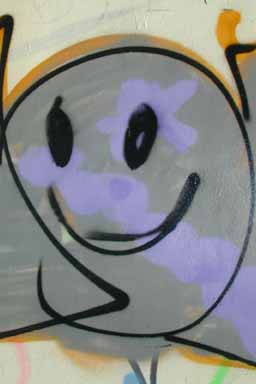 I've been having a good time here at the conference, and I've been trying to use what people have been saying, in this strangely futuristic present, to come up with some sf-nal devices that will give me a little satiric leeway. This is a tough task, and you'll have to forgive me if I seem a little randomized: consider it the effect of undifferentiated enthusiasm.
I've been having a good time here at the conference, and I've been trying to use what people have been saying, in this strangely futuristic present, to come up with some sf-nal devices that will give me a little satiric leeway. This is a tough task, and you'll have to forgive me if I seem a little randomized: consider it the effect of undifferentiated enthusiasm.  Marketers would want that data, and intelligent automated sales devices would assault you as you walked down the street, making pitches attuned to both your current mood and your recent purchase patterns.
Marketers would want that data, and intelligent automated sales devices would assault you as you walked down the street, making pitches attuned to both your current mood and your recent purchase patterns.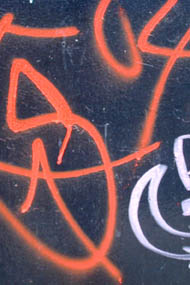 One result would be the loss of plausible deniability: the free exchange of inaccurate information, or the polite lie. Or, as I overheard someone say yesterday, turning his head away from someone else with utter lack of interest, "That's an interesting ideee-a...." I suppose such a comment would gain even more ironic valence if it were absolutely clear exactly how little the speaker thought of the idea.
One result would be the loss of plausible deniability: the free exchange of inaccurate information, or the polite lie. Or, as I overheard someone say yesterday, turning his head away from someone else with utter lack of interest, "That's an interesting ideee-a...." I suppose such a comment would gain even more ironic valence if it were absolutely clear exactly how little the speaker thought of the idea.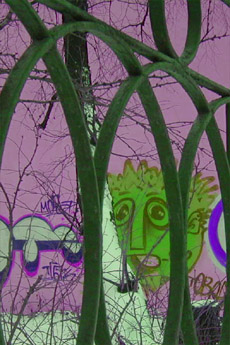 For the near future, I expect that Murphy's law will be in effect — there will be unsurveilled areas and ways in which things will go wrong with the surveillance systems, and there will be subversive artists prepared to find and exploit those opportunities. In the long run, however, artists and creative thinkers will need end-runs around these systems.
For the near future, I expect that Murphy's law will be in effect — there will be unsurveilled areas and ways in which things will go wrong with the surveillance systems, and there will be subversive artists prepared to find and exploit those opportunities. In the long run, however, artists and creative thinkers will need end-runs around these systems. A lot will be done in the near future that will allow visual tracking of individuals, identifying them, and making assumptions about their behavior based on the accessed data. Highway cameras are already being used to identify vehicles, to arrest lawbreakers, and to link to tax records and parking tickets. It's interesting that your presence in a car with a license plate gives authorities the right to search your records for infractions — if they could scan inside the car (and they can), what else would they be able to search for?
A lot will be done in the near future that will allow visual tracking of individuals, identifying them, and making assumptions about their behavior based on the accessed data. Highway cameras are already being used to identify vehicles, to arrest lawbreakers, and to link to tax records and parking tickets. It's interesting that your presence in a car with a license plate gives authorities the right to search your records for infractions — if they could scan inside the car (and they can), what else would they be able to search for?  To quote Gibson again, the future will not be evenly distributed. Privacy will cost you money: rich people, and rich countries, will be able to afford more privacy. You can be "incentivized" to give up your privacy. You are now: if you can afford it, you can pay a premium for your groceries, and your supermarket won't track your purchases. Of course that's not how it's presented to you: You're offered a discount card that's linked to your phone number. My local supermarket knows how much I spend on beer and wine, and whether I eat meat or sugar. And they collect this information because it's useful, not just out of idle curiosity. They could share it with, say a health insurer to determine my insurance rates.
To quote Gibson again, the future will not be evenly distributed. Privacy will cost you money: rich people, and rich countries, will be able to afford more privacy. You can be "incentivized" to give up your privacy. You are now: if you can afford it, you can pay a premium for your groceries, and your supermarket won't track your purchases. Of course that's not how it's presented to you: You're offered a discount card that's linked to your phone number. My local supermarket knows how much I spend on beer and wine, and whether I eat meat or sugar. And they collect this information because it's useful, not just out of idle curiosity. They could share it with, say a health insurer to determine my insurance rates.